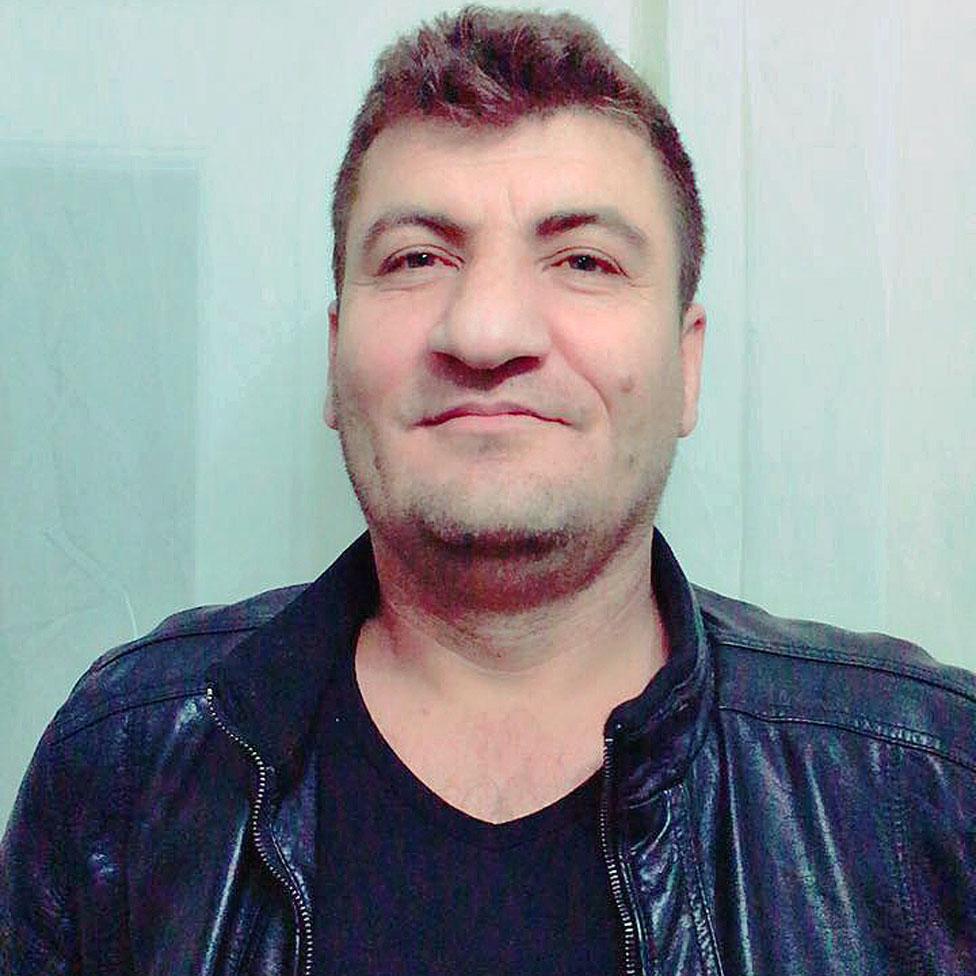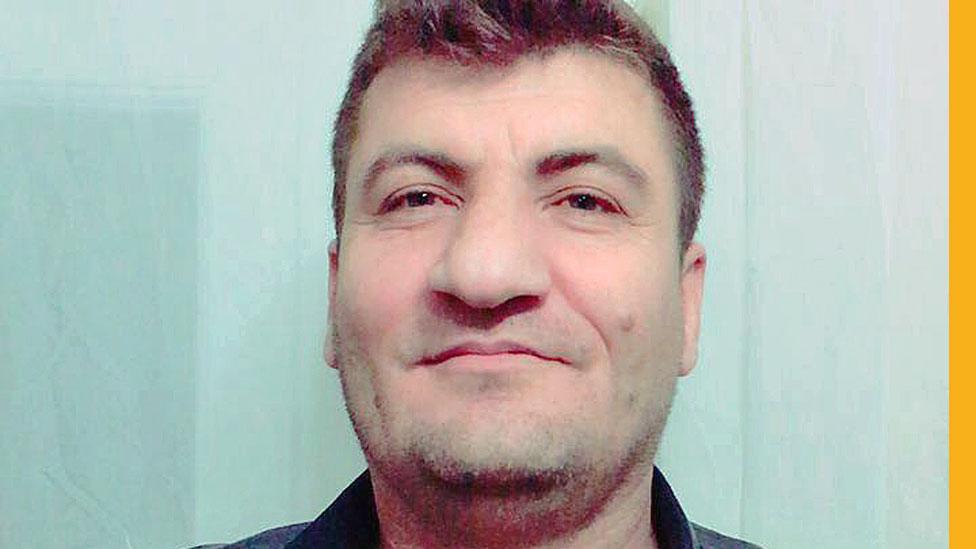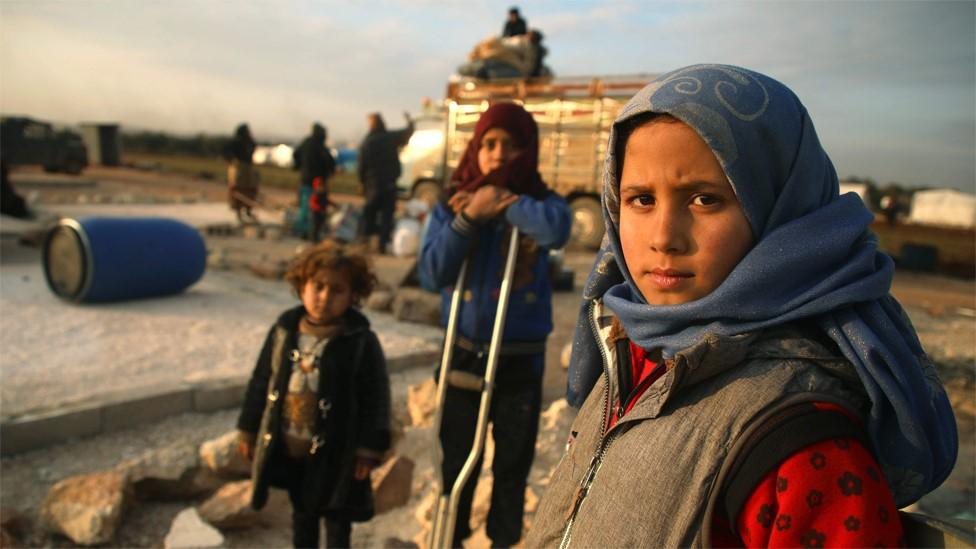Raed Fares: Syria radio host shot dead in Idlib
- Published

Raed Fares' radio station defied threats from jihadist groups and resisted orders to stop playing music

A prominent Syrian radio journalist has been shot dead by gunmen in the rebel-held Syrian province of Idlib.
Raed Fares, a well-known Syrian activist, was killed in the north-western town of Kafranbel.
It was not the first time the founder of Radio Fresh, an independent radio station broadcasting from inside opposition-held areas in the country, had been targeted.
His activism had earned the ire of both militants and the Syrian government.
Four years ago, two gunmen for the Islamic State (IS) militant group shattered several bones and punctured his lung in a failed attempt to silence Fares.
More attempts on his life would follow and yet the former estate agent was determined to carry on.
"He was very much aware that he should not expect to die quietly in his bed," French journalist Nicolas Henin told the BBC.
Henin, who described Fares as "one of the most impressive leaders of the Syrian revolution", explained that even with the constant threats, his friend had refused to carry a weapon.
"It was nothing for himself and because his fight was just dedicated to the people, and to the welfare of all groups, all society," he said.
"I think he believed that that was his best protection."
Defiance
It was not just Fares the militants took issue with. The radio station - with its music and female presenters - also angered the groups which overran the town and surrounding area.
Four years ago, when IS had a presence in Idlib province, the station's office was raided by militants. In 2016, Fares was detained by the Nusra Front, the former al-Qaeda affiliate in Syria.
The Hayat Tahrir al-Sham alliance (HTS), which currently controls most of Idlib province, had ordered Radio Fresh to stop broadcasting music.
Allow X content?
This article contains content provided by X. We ask for your permission before anything is loaded, as they may be using cookies and other technologies. You may want to read X’s cookie policy, external and privacy policy, external before accepting. To view this content choose ‘accept and continue’.
The station's response was to play long sequences of other sounds, such as tweeting birds, clucking chickens and bleating goats.
"They tried to force us to stop playing music on air," Fares told the BBC in 2017. "So we started to play animals in the background as a kind of sarcastic gesture against them."
Later, the station began to introduce further defiant sounds including bongs from London's Big Ben clock, ticking sounds, ringing explosions and chanting football fans.
Another group, the now-dissolved Jabhat Fateh al-Sham, once instructed the radio station to take women off the air. Instead of complying, Fares told the BBC's Mike Thomson about his creative solution to get round the issue.
"We simply put their voices through a computer software programme which makes them sound like men," he said.
'Let them kill me'
But, despite these battles, Fares never forgot the reason he had first gone out on to the streets back in 2011.
Up until the end, he remained a vocal critic of President Bashar al-Assad, the man who has clung to power through seven years of civil war.
In his final Facebook post, Fares described a protest in Kafranbel on 5 October calling for the end of Mr Assad's reign.
"The people of Kafranbel are in Huriyah [Freedom] Square and voices are chanting: The people want the downfall of the regime. We started this in 2011 and we are continuing on. Our loyalty to the martyrs and detainees has increased our determination."
In the end, he did not live to see the end of the war. Radio Fresh's Facebook page posted a graphic photo of Fares' body on 23 November, along with an image of the body of Hammoud Juneid, another activist who was shot dead.
Dozens of people gathered for their funerals the same day as news of his death began to filter out to the wider world, leading to an outpouring of grief on social media from activists and international journalists.
Allow X content?
This article contains content provided by X. We ask for your permission before anything is loaded, as they may be using cookies and other technologies. You may want to read X’s cookie policy, external and privacy policy, external before accepting. To view this content choose ‘accept and continue’.
Among the tributes was one from Fadel Abdul Ghany, founder and chairman of the Syrian Network for Human Rights, who revealed he had asked Fares to leave.
Fares, however, was not to be moved.
"What can they do? Kill me?" he asked. "Well let them kill me. I'm not going to leave and leave them the country."
- Published9 February 2017

- Published18 February 2020

- Published5 September 2018